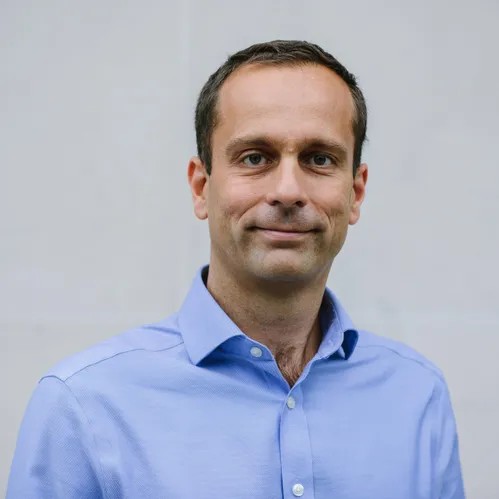Keynote Speakers
Pietro Valdastri – University of Leeds
Talk: “Lifesaving Soft Magnetic Surgical Robots”
When: October 17th, 10:00 am, Aula Magna
Moderator: Federica Ferraguti
Pietro Valdastri is Full Professor and Chair in Robotics and Autonomous Systems at the University of Leeds. He directs the Science and Technologies Of Robotics in Medicine (STORM) Lab, focusing on intelligent robots to fight cancer, the Institute of Robotics, Autonomous System and Sensing (IRASS), and the Robotics at Leeds network. He received his Laurea degree in Electronic Engineering from the University of Pisa in 2001 and his PhD in Biomedical Engineering from Scuola Superiore Sant’Anna in 2006. After the PhD, he became Assistant Professor in Biomedical Engineering at the BioRobotics Institute of Scuola Superiore Sant’Anna. In 2011, Prof Valdastri moved to Vanderbilt University as an Assistant Professor in Mechanical Engineering until 2016, when he relocated to Leeds.
He has published more than 200 peer reviewed journal papers in the field of medical robotics and has been principal investigator on grants in excess of $27M supported by NSF, NIH, ERC, EU-H2020, Cancer Research UK, The Royal Society, EPSRC, ARIA, Innovate UK and industry, including the NSF CAREER Award with the proposal “Lifesaving Capsule Robots” in 2015, the ERC Consolidator Grant Award with the proposal “NoLiMiTs – Novel Lifesaving Magnetic Tentacles” in 2019, and the KUKA Innovation Award for his robotic colonoscopy platform in 2019. Prof. Valdastri is a Royal Society Wolfson Research Fellow, a Fellow of the Institute of Electrical and Electronics Engineers (IEEE), the Editor for Medical and Rehabilitation Robotics of the IEEE Robotics and Automation Letters, and a member of the steering committee of the International Society for Medical Innovation and Technology (iSMIT). STORM Lab’s research has been featured by several news outlets, including the BBC, The Times, The Washington Post, The Financial Times, New Scientist, The Spectator, WIRED, IEEE Spectrum, Medgadget, Daily Mail, The Engineer, Ingenia Magazine, Medical Design Technology Magazine, Medical Xpress, Newswise, NSF Science Now. Prof Valdastri also completed a successful entrepreneurial cycle with WinMedical s.r.l., a company he co-founded in 2009 and that was acquired by a larger enterprise in 2017. He recently started a new company, Atlas Endoscopy Limited, to bring his robotic colonoscopy platform to patients.
Outline of the Talk
Magnetic fields offer the possibility of manipulating objects from a distance and are ideal for medical applications, as they penetrate human tissue without inflicting any harm on the patient. Magnetic fields can be harnessed to actuate surgical robots, enhancing the capabilities of surgeons in reaching deep into the human anatomy through complex winding pathways, thus providing minimally invasive access to organs that are out of reach with current technologies. In this talk, we will explore various robotic architectures based on magnetic control, specifically designed for lifesaving clinical applications. These architectures include a magnetic flexible endoscope for painless colonoscopy, soft magnetic tentacles personalized for reaching peripheral areas of the lung and navigating the pancreatic duct, and magnetic vine robots for endoluminal exploration. We will also discuss enabling technologies, intelligent control, potential levels of computer assistance, the path to first-in-human trials, and highlight the future challenges associated with this emerging technology.
Emanuela Girardi – President of AI, Data and Robotics Association
Talk: “Physical AI: Europe’s opportunity in the global AI race”
When: October 17th, 1:30 pm, Aula Magna
Emanuela Girardi is the President of Adra, the European Association for AI, Data, and Robotics, partner of the European Commission in the AI, Data, and Robotics Public-Private Partnership. She is the founder and president of Pop AI, a non-profit organization dedicated to making artificial intelligence accessible and understandable to everyone. Emanuela is an expert in international AI policy and she has been a member of the Italian Ministry of Economic Development’s expert group on AI, contributing to the drafting Italy’s first national AI strategy. She serves on the industrial board of AIxIA, the Italian association for artificial intelligence, and the Advisory Board of CAIRNE, the confederation of AI laboratories in Europe.
She also brings her expertise to academia, teaching AI and sustainable development at the HumanAIze Master’s program at the Politecnico University of Turin and sits on the board of Fondazione per la Scuola of Compagnia di San Paolo. Recognized as one of the 50 most influential women in technology in Italy, Emanuela is a co-founder and board member of EquALL, an initiative promoting gender equality.
Outline of the Talk
AI is increasingly embodied in physical systems, from industrial robotics to domestic assistants, marking the rise of Physical AI. While the global AI race is today dominated by the US and China, both racing toward AGI and investing massively in AI-powered robots, Europe has a unique opportunity to reposition itself as a key player in this frontier field. In my keynote, I will first introduce ADRA, the European partnership on AI, Data and Robotics, and its role in supporting innovation and technological sovereignty. I will then highlight how Physical AI can be Europe’s strategic leverage: combining our excellence in robotics, manufacturing, and human-centric values to compete globally. At the same time, I will address the challenges still ahead, from technical hurdles to skills gaps, and propose concrete steps such as Qualification and Testing Centers to accelerate safe deployment and adoption. Physical AI is not only about technology: it is about Europe’s chance to reclaim a leadership role in shaping the future of intelligent robotics.
Alessandra Sciutti – Istituto Italiano di Tecnologia
Talk: “Embodied Cognition for Human-Aware Robotics”
When: October 18th, 9.30am, Aula Magna
Moderator: Andrea Demofonti
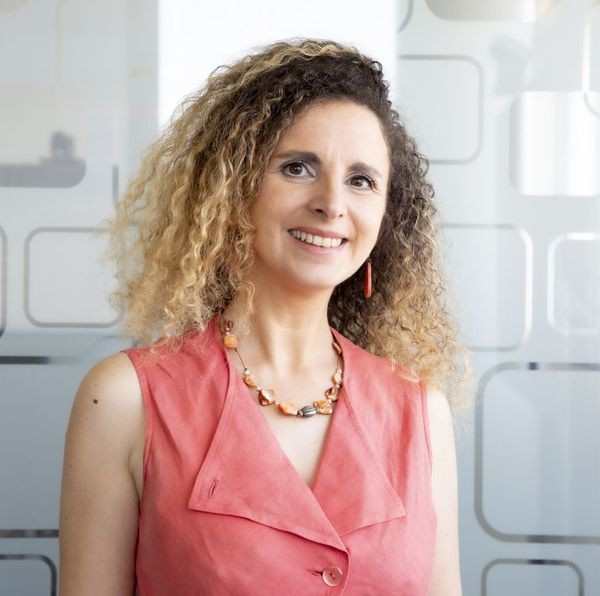 Alessandra Sciutti is a Senior Tenure Track Researcher and head of the CONTACT (COgNiTive Architecture for Collaborative Technologies) Unit of the Italian Institute of Technology (IIT). She received her B.S. and M.S. degrees in Bioengineering and her Ph.D. in Humanoid Technologies from the University of Genova in 2010. After two research periods in the USA and Japan, in 2018, she was awarded the ERC Starting Grant wHiSPER (www.whisperproject.eu), focused on the investigation of joint perception between humans and robots. She has published more than 100 papers and abstracts in international journals and conferences, coordinates the ERC POC Project ARIEL (Assessing Children Manipulation and Exploration Skills), and has participated in the coordination of the CODEFROR European IRSES project (https://www.codefror.eu/). She is currently Chief Editor of the HRI Section of Frontiers in Robotics and AI and Associate Editor for several journals, including the International Journal of Social Robotics and Cognitive System Research. She is an ELLIS scholar and the corresponding co-chair of the IEEE RAS Technical Committee for Cognitive Robotics. Her research aims to investigate the sensory and motor mechanisms underlying mutual understanding in human-human and human-robot interaction.
Alessandra Sciutti is a Senior Tenure Track Researcher and head of the CONTACT (COgNiTive Architecture for Collaborative Technologies) Unit of the Italian Institute of Technology (IIT). She received her B.S. and M.S. degrees in Bioengineering and her Ph.D. in Humanoid Technologies from the University of Genova in 2010. After two research periods in the USA and Japan, in 2018, she was awarded the ERC Starting Grant wHiSPER (www.whisperproject.eu), focused on the investigation of joint perception between humans and robots. She has published more than 100 papers and abstracts in international journals and conferences, coordinates the ERC POC Project ARIEL (Assessing Children Manipulation and Exploration Skills), and has participated in the coordination of the CODEFROR European IRSES project (https://www.codefror.eu/). She is currently Chief Editor of the HRI Section of Frontiers in Robotics and AI and Associate Editor for several journals, including the International Journal of Social Robotics and Cognitive System Research. She is an ELLIS scholar and the corresponding co-chair of the IEEE RAS Technical Committee for Cognitive Robotics. Her research aims to investigate the sensory and motor mechanisms underlying mutual understanding in human-human and human-robot interaction.
Outline of the Talk
Autonomous robots will only become meaningful partners in society if they achieve genuine mutual understanding with humans. This requires moving beyond data-driven models toward embodied architectures that tightly couple perception, action, and cognition. Cognitive competence demands social awareness, just as social skills must be grounded in robust cognitive frameworks.
This talk will argue that embodied cognition provides the foundation to unify these dimensions. By enabling humanoid robots to learn from first-person experience, form episodic memories, and anticipate human intentions, we can create systems that are both intelligent and socially legible. Such robots not only advance human-aware interaction but also serve as experimental probes into the mechanisms of human cognition. I will highlight how predictive, adaptive, and transparent behaviors can emerge from bio-inspired models, with emphasis on non-verbal communication and prospection. This perspective paves the way for robots that are not only technically proficient but also trustworthy long-term partners.
Antonio Bicchi – Univeristy of Pisa
Talk: “From human-robot interaction to human-robot integration”
When: October 18th, 10.00am, Aula Magna
Moderator: Paolo Rocco
 Antonio Bicchi is a scientist interested in robotics, automatic control and haptics. He holds a chair in Robotics at the University of Pisa and leads the Soft Robotics Laboratory at the Italian Institute of Technology in Genova. His research work produced many publications largely used and cited, and earned him several awards, including and is recognized as the Pioneer Award from the IEEE Robotics and Automation Society. He helped start the WorldHaptics Symposium series, the IEEE Robotics and Automation Letters, and the Italian Institute of Robotics and Intelligent Machines. He is currently Editor in Chief of The International Journal of Robotics Research (IJRR).
Antonio Bicchi is a scientist interested in robotics, automatic control and haptics. He holds a chair in Robotics at the University of Pisa and leads the Soft Robotics Laboratory at the Italian Institute of Technology in Genova. His research work produced many publications largely used and cited, and earned him several awards, including and is recognized as the Pioneer Award from the IEEE Robotics and Automation Society. He helped start the WorldHaptics Symposium series, the IEEE Robotics and Automation Letters, and the Italian Institute of Robotics and Intelligent Machines. He is currently Editor in Chief of The International Journal of Robotics Research (IJRR).
Outline of the Talk
For many years, the name of the game in avdanced, human-centric Robotics has been Human-Robot Interaction. In recent years, we have witnessed a further deepening of the relationship between humans and technology. Robotic technologies have been providing definite advances to assist people in need of physical help, including rehabilitation and prosthetics. Working in fields were humans are placed right at the center of the technology, on the other hand, is helping refocus our robotics research itself. In prosthetics, the goal is to have an artificial limb to move naturally and intelligently enough to perform the task that users intend, without requiring their attention. By abstracting this idea, a robot of the future can be thought as a physical “prosthesis” of its user, with sensors, actuators, and intelligence enough to interpret and execute the user intention, translating it in a sensible action of which the user remains the owner.
In the talk I will present how human-robot integration reaches beyond prosthetics and rehabilitation applications to industrial environments. For example, exoskeletons and supernumerary limbs for augmenting human possibilities and shared-autonomy robotic avatars, with the robot executing the human’s intended actions and the human perceiving the context of his/her actions and their consequences.
Plenary Event 1
Round Table “From Curiosity to Application: The Funding Dilemma in Robotics”
When: October 17th, 1:40 pm, Aula Magna
Short abstract: The event explores challenges in securing funding for robotics research, balancing curiosity-driven goals with agency-driven priorities and application-oriented agendas. It will address the need for large investments, global competitiveness, and the ethical implications of dual-use technologies.
Moderators: Gionata Salvietti (University of Siena), Andrea Orlandini (National Research Council of Italy)
Invited Speakers: Emanuela Girardi, Loredana Zollo, Manolo Garabini, Federica Ferraguti, Diego Coglitore, Kashiri Navvab , Matteo Elli, Vito Cacucciolo, Giovanni Berselli
Emanuela Girardi – European Association for AI, Data, and Robotics
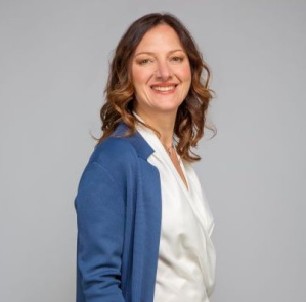 Emanuela Girardi is the President of Adra, the European Association for AI, Data, and Robotics, partner of the European Commission in the AI, Data, and Robotics Public-Private Partnership. She is the founder and president of Pop AI, a non-profit organization dedicated to making artificial intelligence accessible and understandable to everyone. Emanuela is an expert in international AI policy and she has been a member of the Italian Ministry of Economic Development’s expert group on AI, contributing to the drafting Italy’s first national AI strategy. She serves on the industrial board of AIxIA, the Italian association for artificial intelligence, and the Advisory Board of CAIRNE, the confederation of AI laboratories in Europe. She also brings her expertise to academia, teaching AI and sustainable development at the HumanAIze Master’s program at the Politecnico University of Turin and sits on the board of Fondazione per la Scuola of Compagnia di San Paolo. Recognized as one of the 50 most influential women in technology in Italy, Emanuela is a co-founder and board member of EquALL, an initiative promoting gender equality.
Emanuela Girardi is the President of Adra, the European Association for AI, Data, and Robotics, partner of the European Commission in the AI, Data, and Robotics Public-Private Partnership. She is the founder and president of Pop AI, a non-profit organization dedicated to making artificial intelligence accessible and understandable to everyone. Emanuela is an expert in international AI policy and she has been a member of the Italian Ministry of Economic Development’s expert group on AI, contributing to the drafting Italy’s first national AI strategy. She serves on the industrial board of AIxIA, the Italian association for artificial intelligence, and the Advisory Board of CAIRNE, the confederation of AI laboratories in Europe. She also brings her expertise to academia, teaching AI and sustainable development at the HumanAIze Master’s program at the Politecnico University of Turin and sits on the board of Fondazione per la Scuola of Compagnia di San Paolo. Recognized as one of the 50 most influential women in technology in Italy, Emanuela is a co-founder and board member of EquALL, an initiative promoting gender equality.Loredana Zollo – Università Campus Bio-Medico di Roma
 Loredana Zollo received MS in electronic engineering in 2000 from Università degli Studi di Napoli “Federico II”, and the PhD in Bioengineering in 2004 from Scuola Superiore Sant’Anna di Pisa. She is Full Professor of Bioengineering, Dean of Engineering and Director of the PhD Program in Bioengineering, Applied Sciences and Intelligent Systems at Università Campus Bio-Medico di Roma. In the same university she is the director of the CREO Lab – Laboratory of Advanced Robotics and Human-Centred Technologies. She currently is President of the National Institute for Robotics and Intelligent Machines (I-RIM), a non-profit association established with the mission to promote the development and application of robotic technologies and intelligent systems, with the overarching aim of enhancing societal well-being, improving quality of life, and supporting the sustainability of production systems. Loredana Zollo’s research interests are mainly in the fields of biomedical robotics, biorobotics and bionics, human-machine interfaces, collaborative robotics, robotics for agritech. She has been involved in 40+ EU-funded and national projects in her application fields. She has authored/co-authored 250+ scientific publications and 7 patents.
Loredana Zollo received MS in electronic engineering in 2000 from Università degli Studi di Napoli “Federico II”, and the PhD in Bioengineering in 2004 from Scuola Superiore Sant’Anna di Pisa. She is Full Professor of Bioengineering, Dean of Engineering and Director of the PhD Program in Bioengineering, Applied Sciences and Intelligent Systems at Università Campus Bio-Medico di Roma. In the same university she is the director of the CREO Lab – Laboratory of Advanced Robotics and Human-Centred Technologies. She currently is President of the National Institute for Robotics and Intelligent Machines (I-RIM), a non-profit association established with the mission to promote the development and application of robotic technologies and intelligent systems, with the overarching aim of enhancing societal well-being, improving quality of life, and supporting the sustainability of production systems. Loredana Zollo’s research interests are mainly in the fields of biomedical robotics, biorobotics and bionics, human-machine interfaces, collaborative robotics, robotics for agritech. She has been involved in 40+ EU-funded and national projects in her application fields. She has authored/co-authored 250+ scientific publications and 7 patents.Manolo Garabini – University of Pisa

Received the graduation degree in mechanical engineering and the Ph.D. degree in robotics from the University of Pisa, Pisa, Italy, in 2010 and 2014, respectively. He is currently a Professor at the University of Pisa. He was the Principal Investigator of the THING H2020 EU Research Project for the University of Pisa and the Coordinator of the Dysturbance H2020 Eurobench Subproject and of the H2020 EU Research Project Natural Intelligence. He is now the coordinator of the personal grant FISA23 OCCAM. He is a co-founder of two companies, qbrobotics s.r.l. and Xstar Motion s.r.l. His main research interests include the design, planning, and control of soft adaptive robots.
Federica Ferraguti – University of Modena and Reggio Emilia
 Federica Ferraguti is currently an Associate Professor at the University of Modena and Reggio Emilia, Italy. She received her B.Sc. and M.Sc. degrees in Management Engineering from the University of Modena and Reggio Emilia (Italy) in 2008 and 2011, respectively, and her Ph.D. in Industrial Innovation Engineering from the same university in 2015. She was a Visiting Researcher at the Rehabilitation Engineering Lab at ETH Zurich, Switzerland, in 2013. Her research deals with surgical robotics, collaborative robotics, industrial robotics, augmented reality, teleoperation, control of robotic systems, human-robot physical interaction, and learning from demonstration. She received the “Fabrizio Flacco Young Author Best Paper Award 2017” from the IEEE Robotics and Automation Society – Italian Chapter. She has participated in numerous national and European projects and research activities funded by industries. She was involved in the FAR2022 project “Robot-assisted percutaneous nephrolithotomy with ultrasound guidance and 3D reconstruction overlay” as Principal Investigator and in the PRIN2022 project “Predictive modelling of omics biomarkers in temporal lobe epilepsy: a comprehensive multidisciplinary and translational approach from rodents to humans” as Associate Principal Investigator. She was awarded a FIS2 Starting Grant for the project “Trustworthy Robotic Assistant for Improved Minimally Invasive Surgery” (Fondo Italiano per la Scienza, Ministry of University and Research). She is the author of over 50 scientific papers and an inventor on 5 patents.
Federica Ferraguti is currently an Associate Professor at the University of Modena and Reggio Emilia, Italy. She received her B.Sc. and M.Sc. degrees in Management Engineering from the University of Modena and Reggio Emilia (Italy) in 2008 and 2011, respectively, and her Ph.D. in Industrial Innovation Engineering from the same university in 2015. She was a Visiting Researcher at the Rehabilitation Engineering Lab at ETH Zurich, Switzerland, in 2013. Her research deals with surgical robotics, collaborative robotics, industrial robotics, augmented reality, teleoperation, control of robotic systems, human-robot physical interaction, and learning from demonstration. She received the “Fabrizio Flacco Young Author Best Paper Award 2017” from the IEEE Robotics and Automation Society – Italian Chapter. She has participated in numerous national and European projects and research activities funded by industries. She was involved in the FAR2022 project “Robot-assisted percutaneous nephrolithotomy with ultrasound guidance and 3D reconstruction overlay” as Principal Investigator and in the PRIN2022 project “Predictive modelling of omics biomarkers in temporal lobe epilepsy: a comprehensive multidisciplinary and translational approach from rodents to humans” as Associate Principal Investigator. She was awarded a FIS2 Starting Grant for the project “Trustworthy Robotic Assistant for Improved Minimally Invasive Surgery” (Fondo Italiano per la Scienza, Ministry of University and Research). She is the author of over 50 scientific papers and an inventor on 5 patents.Diego Coglitore – Agenzia Per la Promozione della Ricerca Europea
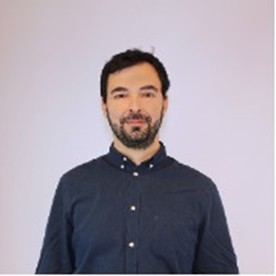 Diego Coglitore holds a degree in Biomedical Engineering from Sapienza University of Rome and a PhD in Nanoscience from the University of Liverpool. After graduation, he first worked in industry as a biomedical device production manager (Rieti), before embarking on a research career, first in the UK (University of Liverpool), then in France (Institut Europèen des Membranes, Montpellier), and finally in Italy (CNR Nanotec, Lecce). He then worked as a consultant for R&D projects at both a European and national level, finally joining APRE in 2022. Here, he is responsible for Cluster 4 activities and the management of the NCP4Industry Plus project, the network of national contact points for Cluster 4. Throughout his career, he has participated in European research and development projects with various TRLs, both as a researcher and in their management: Horizon Europe and Horizon 2020 projects, the Life programme, Urban Innovation Action, CEF, and EIC
Diego Coglitore holds a degree in Biomedical Engineering from Sapienza University of Rome and a PhD in Nanoscience from the University of Liverpool. After graduation, he first worked in industry as a biomedical device production manager (Rieti), before embarking on a research career, first in the UK (University of Liverpool), then in France (Institut Europèen des Membranes, Montpellier), and finally in Italy (CNR Nanotec, Lecce). He then worked as a consultant for R&D projects at both a European and national level, finally joining APRE in 2022. Here, he is responsible for Cluster 4 activities and the management of the NCP4Industry Plus project, the network of national contact points for Cluster 4. Throughout his career, he has participated in European research and development projects with various TRLs, both as a researcher and in their management: Horizon Europe and Horizon 2020 projects, the Life programme, Urban Innovation Action, CEF, and EICNavvab Kashiri – Leonardo Innovation Hub
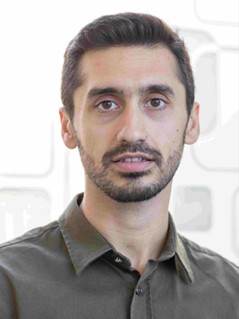 Navvab Kashiri is Principal Investigator of the Robotics Lab at Leonardo Innovation Hub, where he leads research at the intersection of academia and industry. He received his Ph.D. in Robotics from the Italian Institute of Technology (IIT) in 2025, focusing on the design and control of robotic platforms with emphasis on modularity, energy efficiency, and agility. He has been actively engaged in national and international collaborations on the development of robotic systems with enhanced capabilities, contributing to Leonardo’s mission of advancing next-generation solutions for adaptability and autonomy.
Navvab Kashiri is Principal Investigator of the Robotics Lab at Leonardo Innovation Hub, where he leads research at the intersection of academia and industry. He received his Ph.D. in Robotics from the Italian Institute of Technology (IIT) in 2025, focusing on the design and control of robotic platforms with emphasis on modularity, energy efficiency, and agility. He has been actively engaged in national and international collaborations on the development of robotic systems with enhanced capabilities, contributing to Leonardo’s mission of advancing next-generation solutions for adaptability and autonomy.Matteo Elli – Pariter Partners
 Matteo Elli is the Founder of Pariter Partners, a leading Italian investment firm active in deep-tech, early-stage and tech transfer initiatives, with a focus on robotics and automation. He is also the Founder of RoboIT, the first national tech transfer hub in Italy dedicated to robotics and automation. With over 20 years of experience in venture capital, corporate finance, M&A, fund of funds and startup investing, Matteo has held roles at Mediobanca, Fondo Italiano d’Investimento, Sella Ventures (Banca Sella), and Eniverse Ventures (Eni), contributing to the growth of the Italian innovation ecosystem.
Matteo Elli is the Founder of Pariter Partners, a leading Italian investment firm active in deep-tech, early-stage and tech transfer initiatives, with a focus on robotics and automation. He is also the Founder of RoboIT, the first national tech transfer hub in Italy dedicated to robotics and automation. With over 20 years of experience in venture capital, corporate finance, M&A, fund of funds and startup investing, Matteo has held roles at Mediobanca, Fondo Italiano d’Investimento, Sella Ventures (Banca Sella), and Eniverse Ventures (Eni), contributing to the growth of the Italian innovation ecosystem.Vito Cacucciolo – Politecnico di Bari
 Vito Cacucciolo is an Associate Professor at Politecnico di Bari (Italy), an affiliate researcher at MIT (US), and the CEO of the spin-off Omnigrasp Srl. Vito obtained his Ph.D. in 2017 from Scuola Superiore Sant’Anna Pisa (Italy) and from 2017 to 2021 worked as a scientist at EPFL in Switzerland. Vito received an ERC Starting Grant in 2023 for the project ROBOFLUID, with the goal of building a new generation of wearable robots powered by electro-fluidic muscles. As CEO of Omnigrasp, Vito is leading the development of soft end effectors that use electroactive contacts to grasp complex objects in flexible automation, such as in the EU-funded project HARTU. Vito leads the RoboPhysics Laboratory (RPL) at Politecnico di Bari, a group of 15 people from Assistant professors to Master students. Vito’s research to date received an h-index of 20 and over 5000 citations.
Vito Cacucciolo is an Associate Professor at Politecnico di Bari (Italy), an affiliate researcher at MIT (US), and the CEO of the spin-off Omnigrasp Srl. Vito obtained his Ph.D. in 2017 from Scuola Superiore Sant’Anna Pisa (Italy) and from 2017 to 2021 worked as a scientist at EPFL in Switzerland. Vito received an ERC Starting Grant in 2023 for the project ROBOFLUID, with the goal of building a new generation of wearable robots powered by electro-fluidic muscles. As CEO of Omnigrasp, Vito is leading the development of soft end effectors that use electroactive contacts to grasp complex objects in flexible automation, such as in the EU-funded project HARTU. Vito leads the RoboPhysics Laboratory (RPL) at Politecnico di Bari, a group of 15 people from Assistant professors to Master students. Vito’s research to date received an h-index of 20 and over 5000 citations.Giovanni Berselli – University of Genova
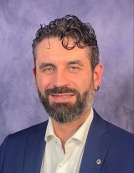 Giovanni Berselli is Full Professor and Chair of Design Methods for Industrial Engineering at the University of Genova and Affiliated Researcher with the Advanced Robotics Department at the Italian Institute of Technology (IIT). Currently, Prof. Berselli is the Coordinator of the PhD Degree in Mechanical, Energy and Management Engineering at the University of Genova, Coordinator of Research Activities within his department and Delegate for International Relations. He is a Fellow of the ASME, the Chair of ASME Italy Section, the past Chair of the ASME Technical Committee on Modeling, Dynamics, and Control of Adaptive Systems. He held Excellence Fellowships at the Technical University of Munich, at the German Aerospace Agency (DLR), and at the Karlsruhe Institute of Technology. In the recent past, he has been a Visiting & Affiliated Scientist at Harvard University & Massachusetts General Hospital, at the University of Twente, at Monash University, Australia, and with the School of Advanced Studies of the University of Navarra, Spain. He has authored more than 240 publications and has served as General Chair of the Mechanisms and Robotic Conference at ASME IDETC and at IEEE/ASME AIM 2026 – Int. Conference on Advanced Intelligent Mechatronics. His scientific activity is focused on the modelling, control and experimental evaluation of: i) robot hands and grippers; ii) compliant/soft actuators for safe human-robot interaction; iii) exoskeletons iv) energy-aware industrial robotics.
Giovanni Berselli is Full Professor and Chair of Design Methods for Industrial Engineering at the University of Genova and Affiliated Researcher with the Advanced Robotics Department at the Italian Institute of Technology (IIT). Currently, Prof. Berselli is the Coordinator of the PhD Degree in Mechanical, Energy and Management Engineering at the University of Genova, Coordinator of Research Activities within his department and Delegate for International Relations. He is a Fellow of the ASME, the Chair of ASME Italy Section, the past Chair of the ASME Technical Committee on Modeling, Dynamics, and Control of Adaptive Systems. He held Excellence Fellowships at the Technical University of Munich, at the German Aerospace Agency (DLR), and at the Karlsruhe Institute of Technology. In the recent past, he has been a Visiting & Affiliated Scientist at Harvard University & Massachusetts General Hospital, at the University of Twente, at Monash University, Australia, and with the School of Advanced Studies of the University of Navarra, Spain. He has authored more than 240 publications and has served as General Chair of the Mechanisms and Robotic Conference at ASME IDETC and at IEEE/ASME AIM 2026 – Int. Conference on Advanced Intelligent Mechatronics. His scientific activity is focused on the modelling, control and experimental evaluation of: i) robot hands and grippers; ii) compliant/soft actuators for safe human-robot interaction; iii) exoskeletons iv) energy-aware industrial robotics.Plenary Event 2
Round Table: “Do we really need humanoids?”
When: October 18th, 14:00 pm, Aula Magna
Short abstract: Humanoids robots are currently a hot topic in the media. In China, humanoids welcome people in hotels. Is this creating potential discomfort? As researchers and developers, we are facing the question: can we envisage a future where humanoids will surround us in our everyday life or just in some professional situations?
Moderators: Calogero Oddo and Gabriele Costante
Invited Speakers: Francesco Ferro (PAL), Fabio Puglia (Oversonic), Alessandra Sciutti (IIT)
Francesco Ferro – PAL Robotics
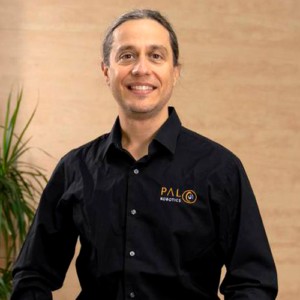
Francesco obtained a MSc degree in Telecommunications Engineering in 2002 at the Politecnico di Torino. He began a PhD in Computer Vision, but left in 2004 to found PAL Robotics. He started working with the development of stereo vision algorithms and later joined the autonomous robot navigation team in order to implement various SLAM algorithms. In 2008, he became the manager of PAL Robotics´ software department. He obtained an MBA at the UB university in Barcelona in 2011 and became CEO of PAL Robotics, in charge of the company’s humanoid robot development.
Fabio Puglia – Oversonic
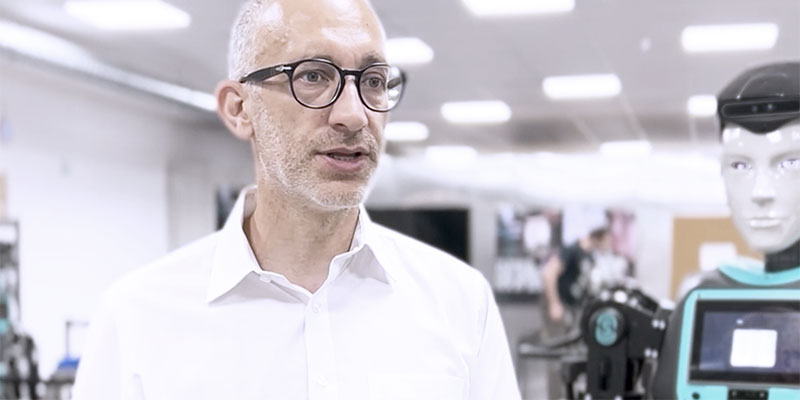
With a degree in Physics and Mathematics specializing in Astrophysics from the University of Milan, President Fabio Puglia has diverse experience ranging from robotics to automation. In 2013, Fabio Puglia led a project in Tel Aviv involving European and Israeli players in Water Management. A year later, in 2014, he signed international technological partnership agreements in Abu Dhabi in the presence of former Prime Minister Gianni Letta. In 2017, he participated in the ICT congress in Pasadena organized by NASA, discussing the innovative heat recovery system into energy developed by ISC, a company he founded in Carate Brianza. In 2020, he met Paolo Denti and together they decided to launch a startup developing advanced robotics systems.
Alessandra Sciutti – Italian Institute of Technology

Alessandra Sciutti is a Senior Tenure Track Researcher and head of the CONTACT (COgNiTive Architecture for Collaborative Technologies) Unit of the Italian Institute of Technology (IIT). She received her B.S. and M.S. degrees in Bioengineering and her Ph.D. in Humanoid Technologies from the University of Genova in 2010. After two research periods in the USA and Japan, in 2018, she was awarded the ERC Starting Grant wHiSPER (www.whisperproject.eu), focused on the investigation of joint perception between humans and robots. She has published more than 100 papers and abstracts in international journals and conferences, coordinates the ERC POC Project ARIEL (Assessing Children Manipulation and Exploration Skills), and has participated in the coordination of the CODEFROR European IRSES project (https://www.codefror.eu/). She is currently Chief Editor of the HRI Section of Frontiers in Robotics and AI and Associate Editor for several journals, including the International Journal of Social Robotics and Cognitive System Research. She is an ELLIS scholar and the corresponding co-chair of the IEEE RAS Technical Committee for Cognitive Robotics. Her research aims to investigate the sensory and motor mechanisms underlying mutual understanding in human-human and human-robot interaction.

